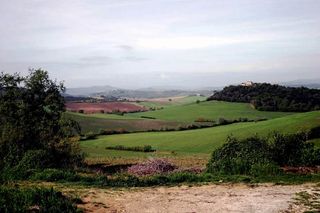A Mysterious Stroll Through Human History

Wanderlust. Being human is apparently all about wanderlust. Today, we are a global species, that is, found on every continent, because 200,000 years ago fully modern humans pulled up stakes and took off. First we moved out of Africa, going north and then around the Mediterranean, spreading quickly into Europe, the Balkans and the Middle East. Following in the footsteps of Homo erectus, much earlier ancestors, modern humans then laced up their walking shoes again and headed out across the globe, not even stopping when faced with water. Wide Pacific? No problem. We built boats and sailed across ocean, populating islands as we went. Eventually, the route northeast ended up in Siberia. Our ancestors didn’t know it—after all they had no maps—but there were two other another continents right across the road, continents empty of humans but full of resources. The Americas were the last place on Earth without humans until about 12,000 years ago (well, Antarctica too, but then why would a hairless ape go there?). Early humans could have gotten there by boat across the Pacific, but that would have required a mighty armada beaching up and down the coast of North and South America, an unlikely prospect. Instead, archeologists have long preferred the idea of multiple migrations overland from Siberia to Alaska, across the Bering Strait when the water was low and the strait was open country. Recent research by an international team of geneticists has tested this hypothesis by comparing the DNA of living people from Siberia with Native Americans and discovered that this march into the New World was probably one major migration, not recurring flits from one continent to another. More interesting, it looks like our kind stuck to the coast, enjoying the ocean view all the way into South America, and then they quickly spread inland. But what no one can really understand is why these people left home in the first place. They were surely hunters and gatherers, but even hunters and gatherers have a home base. And as we all know when asked to move across the country for a new job, it's not easy leaving a familiar landscape and wandering into new territory. Imagine our ancestors, fully equipped with big brains, warm clothing and excellent weaponry, placing a foot on the land between Siberia and Canada. Were they being chased by hoards of unfriendly others? Or were they simply following the food. Back then, the Bering Strait was not a frozen sea passage but a broad expanse of land, probably covered with herds of hoofed, tasty animals. There might also have been choice plant life found only in Alaska, or California, or Peru that beckoned. Or maybe it was whimsical. Perhaps they woke up one morning and said, "Let's go for a stroll," and suddenly, they were on the coast of Oregon looking at the beach. One thing we do know is that humans have an innate desire to move on, and on, and on.
- Top 10 Intrepid Explorers
- 10 Things You Didn't Know About You
- Vote for the Greatest Modern Mind
Meredith F. Small is an anthropologist at Cornell University. She is also the author of "Our Babies, Ourselves; How Biology and Culture Shape the Way We Parent" (link) and "The Culture of Our Discontent; Beyond the Medical Model of Mental Illness" (link).
Sign up for the Live Science daily newsletter now
Get the world’s most fascinating discoveries delivered straight to your inbox.
